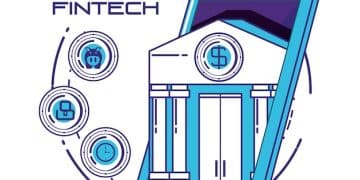Blockchain & Healthcare: Enhancing Data Security and Patient Outcomes in the US

Blockchain and healthcare are converging to revolutionize data security and patient outcomes in the US by providing enhanced interoperability and secure data sharing. This technology ensures data integrity, reduces fraud, and empowers patients with greater control over their health information.
The healthcare industry in the United States faces persistent challenges in data security and patient outcomes. Traditional systems are often fragmented, leading to data breaches, inefficiencies, and compromised patient care. But what if there was a technology that could address these issues head-on? Enter blockchain.
Blockchain and healthcare: How it can improve data security and patient outcomes in the US is not just a buzzword; it’s a viable solution poised to transform how healthcare data is managed and secured, offering unprecedented opportunities for improved interoperability, reduced costs, and enhanced patient experiences. Let’s explore how blockchain technology is reshaping the healthcare landscape in the US.
Understanding Blockchain Technology
Blockchain, at its core, is a distributed, decentralized, public ledger that records transactions in a secure, transparent, and immutable manner. This technology was first introduced with Bitcoin but its potential extends far beyond cryptocurrencies. In essence, blockchain creates a tamper-proof record that is shared across a network of computers, making it highly resistant to fraud and manipulation.
Key Features of Blockchain
Several key features make blockchain particularly well-suited for healthcare applications:
- Decentralization: Data is not stored in a single location, reducing the risk of a single point of failure.
- Transparency: All participants in the network can view the transactions, enhancing accountability.
- Immutability: Once a transaction is recorded, it cannot be altered or deleted, ensuring data integrity.
- Security: Cryptographic techniques secure the data and prevent unauthorized access.
The decentralized and secure nature of blockchain can address many of the vulnerabilities inherent in traditional healthcare systems, paving the way for more efficient and reliable data management.

In healthcare, the implications of such a system are profound. Imagine a scenario where patient records are securely and transparently shared among healthcare providers, reducing administrative overhead, and improving the accuracy of patient information. That’s just a glimpse of what blockchain can offer.
Enhancing Data Security in Healthcare with Blockchain and Healthcare: How It Can Improve Data Security and Patient Outcomes in the US
Data breaches are a significant concern in the healthcare industry. Protected Health Information (PHI) is a prime target for cybercriminals, leading to financial losses, reputational damage, and compromised patient privacy. Blockchain technology offers a robust defense against these threats.
Secure Data Storage
Blockchain’s decentralized storage model ensures that patient data is not concentrated in a single vulnerable location. Each block in the chain is linked to the previous one using cryptographic hashes, making it virtually impossible to alter the data without detection.
Access Control
Blockchain enables fine-grained access control, allowing patients to grant or revoke access to their health information. This empowers patients with greater control over their data and ensures that only authorized individuals can access sensitive information.
- Improved Interoperability: Blockchain facilitates secure and seamless data exchange between different healthcare providers and systems.
- Reduced Fraud: The immutable nature of blockchain makes it difficult to commit fraud, such as billing schemes or prescription drug abuse.
- Enhanced Patient Privacy: Blockchain’s access control features give patients more control over who can access their medical records.
By leveraging blockchain, healthcare organizations can significantly enhance their data security posture, safeguarding patient information and maintaining regulatory compliance.
Improving Patient Outcomes
Beyond security, blockchain has the potential to improve patient outcomes by enabling more efficient and coordinated care. By providing a secure and transparent platform for sharing patient data, blockchain can facilitate better decision-making and personalized treatment plans.

Real-Time Data Sharing
Healthcare providers can access a patient’s comprehensive medical history in real-time, regardless of where the patient has received care. This can prevent medical errors, reduce redundant tests, and improve the overall quality of care.
Supply Chain Management
Blockchain can be used to track and verify the authenticity of pharmaceutical products, preventing counterfeit drugs from entering the supply chain. This is particularly important for high-value or life-saving medications.
Consider the implications for clinical trials. Blockchain can ensure the integrity and transparency of trial data, reducing the risk of bias and improving the reliability of results. This can accelerate the development of new treatments and therapies.
Challenges and Opportunities for Blockchain and Healthcare: How It Can Improve Data Security and Patient Outcomes in the US
While the potential benefits of blockchain and healthcare: How it can improve data security and patient outcomes in the US are significant, there are also challenges to consider. These include scalability, regulatory uncertainty, and the need for standardization.
Scalability
Implementing blockchain on a large scale requires overcoming scalability issues. The existing blockchain networks may not be able to handle the high volume of transactions generated by the healthcare industry.
Regulatory Uncertainty
Regulations surrounding the use of blockchain in healthcare are still evolving. Clear guidelines are needed to ensure compliance with HIPAA and other privacy laws.
Despite these challenges, the opportunities for blockchain and healthcare: How it can improve data security and patient outcomes in the US are immense. By addressing these issues, the healthcare industry can unlock the full potential of blockchain to transform data security and patient care.
Use Cases of Blockchain in Healthcare
The application of blockchain in healthcare is already showing promise across various areas. Here are a few compelling use cases:
- Electronic Health Records (EHR): Blockchain can provide a secure and interoperable platform for managing EHRs.
- Supply Chain Management: Tracking pharmaceutical products and medical devices to prevent counterfeiting.
- Claims Processing: Streamlining and automating claims processing to reduce administrative costs and fraud.
- Clinical Trials: Ensuring the integrity and transparency of clinical trial data.
These use cases highlight the versatility of blockchain and its potential to address a wide range of challenges in the healthcare industry, while improving blockchain and healthcare: How it can improve data security and patient outcomes in the US.
The Future of Blockchain in US Healthcare
As blockchain technology matures and adoption increases, its impact on the US healthcare system will continue to grow. We can expect to see more innovative applications of blockchain emerging in the coming years, driven by the need for greater data security, interoperability, and patient empowerment. The integration of blockchain and healthcare: How it can improve data security and patient outcomes in the US is poised to revolutionize the industry.
Collaboration and Standardization
Successful implementation of blockchain in healthcare will require collaboration among industry stakeholders, including healthcare providers, technology vendors, and regulatory agencies. Standardization of blockchain protocols and data formats is also essential to ensure interoperability. Moreover, to improve blockchain and healthcare: How it can improve data security and patient outcomes in the US we need to focus on how to incorporate new models.
| Key Point | Brief Description |
|---|---|
| 🔒 Data Security | Blockchain enhances security through decentralization and immutability. |
| 🧑⚕️ Patient Outcomes | Real-time data sharing improves decision-making and personalized treatment. |
| 🛡️ Fraud Reduction | Blockchain’s transparency makes it difficult to commit fraud. |
| 🔗 Interoperability | Facilitates secure data exchange between different healthcare systems. |
Frequently Asked Questions
Blockchain enhances data security by using decentralization and cryptography, preventing unauthorized access and ensuring data integrity. This drastically improves safeguards for healthcare information.
Key challenges include scalability, regulatory uncertainty, and the need for standardization across different systems. Addressing these issues is crucial for successful implementation.
Yes, blockchain can effectively track and verify the authenticity of pharmaceutical products, preventing counterfeit drugs from entering the supply chain and endangering patients.
Patients gain greater control over their health records, improved privacy, and more efficient and coordinated care, leading to better health outcomes and a better experience.
Standardization is crucial as it ensures different healthcare systems can securely and seamlessly exchange data. This interoperability is essential for blockchain’s success in healthcare.
Conclusion
In conclusion, blockchain and healthcare: How it can improve data security and patient outcomes in the US represents a transformative opportunity for the healthcare industry. By enhancing data security, improving patient outcomes, and streamlining processes, blockchain has the potential to revolutionize healthcare delivery.





